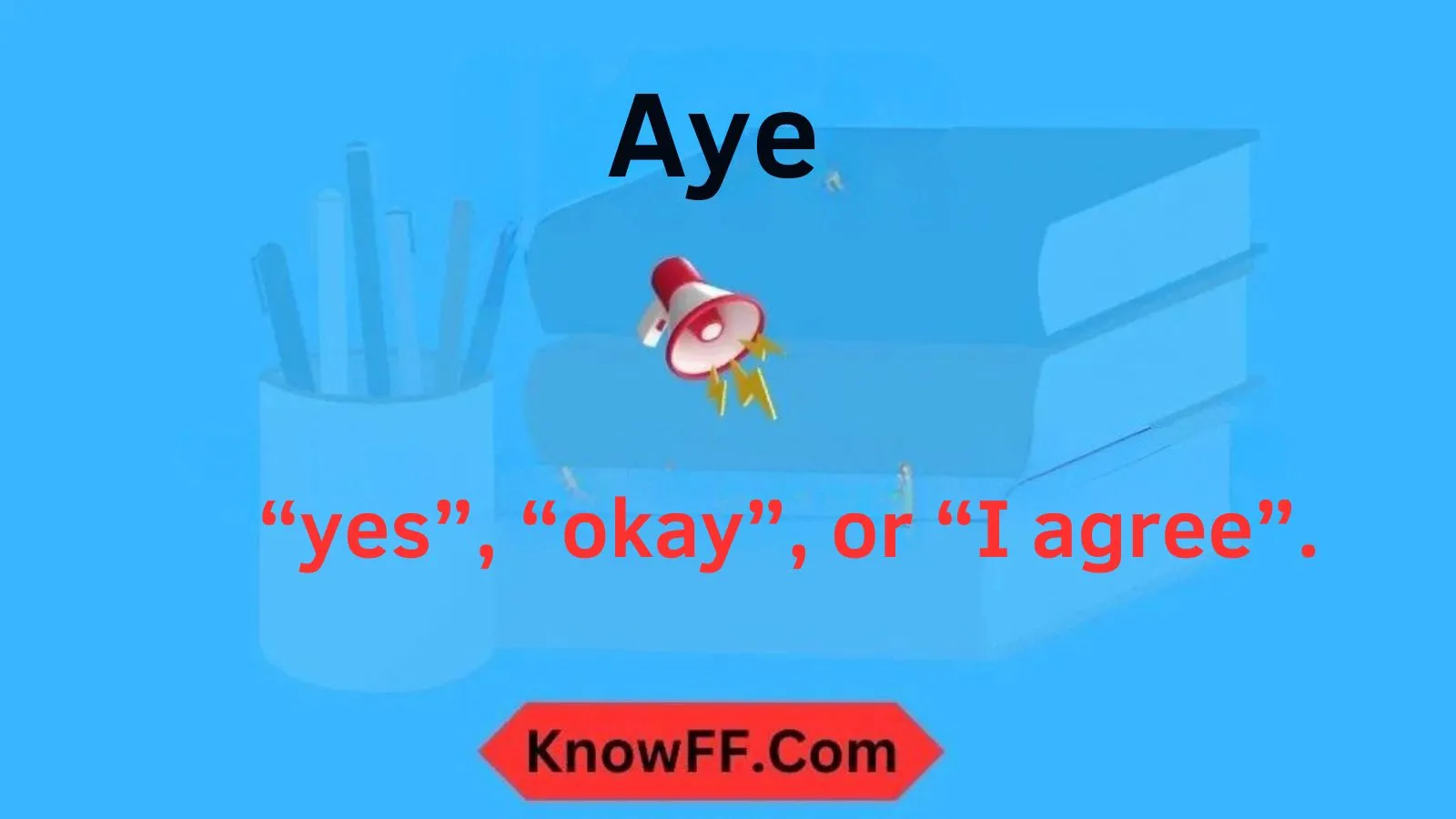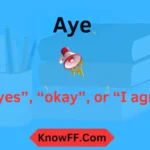In today’s fast-paced digital world, abbreviations and slang dominate our online conversations.
One such term that often puzzles people is “aye”. While seemingly simple, this word carries multiple meanings depending on context, platform, and even professional fields.
Users frequently encounter it in texting, social media, dating apps, and even formal discussions, prompting searches to clarify its definition.
This article explores the different facets of aye, its background, contexts, common misconceptions, and alternatives, making it a comprehensive guide for anyone curious about modern communication.
Meaning & Definition
The word “aye” is primarily an informal expression used in texts, chats, and verbal communication. In most casual conversations, it is synonymous with “yes”, “okay”, or “I agree”.
Depending on tone and context, it can also express enthusiasm, affirmation, or acknowledgment. For example, if someone texts, “Are you coming to the party?” replying with “aye” signals agreement or confirmation in a friendly, informal manner.
Linguistically, aye has roots in Middle English, historically used as a simple affirmative. Over time, it has migrated into modern texting culture, retaining its positive and confirming undertones while adapting to online platforms. The versatility of aye makes it a favorite in digital communication where brevity and casual tone are essential.
Background
Historically, aye was used in parliamentary or nautical contexts to indicate agreement or a vote in favor. For example, during formal meetings or shipboard discussions, participants would say “aye” to signify approval. This traditional usage laid the groundwork for its modern meaning, as online users adopted the term for its concise and affirmative nature.
The rise of texting, social media platforms, and instant messaging has popularized aye in casual settings. Platforms like WhatsApp, Instagram, and TikTok have given it a trendy, youthful feel. Unlike older affirmatives such as “yes” or “yeah,” aye conveys friendliness and a conversational tone, making it ideal for quick interactions.
Usage in Different Contexts
Chat, Social Media, and Professional Fields
In casual chat, aye is often playful and informal. For instance, friends texting each other about plans may respond with aye to show agreement or enthusiasm. On social media, the term can appear in captions or comments to express excitement or acknowledgment.
In professional fields, aye is rarely used in formal communication due to its informal tone. However, it may appear in team chats or informal corporate messaging to quickly confirm tasks or agree with ideas. Understanding the context is crucial to avoid appearing unprofessional.
Meaning in Chat, WhatsApp, Instagram, TikTok
On messaging platforms like WhatsApp and Instagram, aye is a shorthand affirmative that adds personality to texts. It can replace “yes,” “okay,” or “sure,” while subtly conveying friendliness or agreement. TikTok trends often feature aye in videos or captions to enhance relatability or express excitement. Its brevity makes it ideal for quick responses, where users want to maintain a casual tone without typing full sentences.
Meaning in Physics, Medical, and Aircraft Terminology
While aye is widely used in casual texts, it also appears in specific professional contexts:
- Physics: Rarely used as a term, though sometimes seen in historical texts or shorthand notations.
- Medical: Not common in medical terminology; any appearance is usually an abbreviation unrelated to the casual meaning.
- Aircraft: In aviation, “aye” is often used in radio communication as a confirmation of instructions, similar to “roger” or “affirmative.”
Common Misconceptions
Many users mistakenly assume aye is slang or informal exclusively. While it is casual in texting, its historical and professional uses show a broader scope. Another misconception is confusing it with “hey,” which is a greeting rather than an affirmation. Misinterpretations can lead to awkward conversations if the context is ignored.
Similar Terms & Alternatives
Words similar to aye include:
- Yes
- Yeah
- Yup
- Roger
- Affirmative
- Sure
- Okay
These alternatives vary in tone and context, with aye often leaning toward informal and friendly communication. Selecting the right synonym depends on the platform and audience.
How to Respond to It
When someone replies with aye, you can:
- Respond with aye in return to mirror casual agreement.
- Use emojis or thumbs-up to reinforce acknowledgment.
- Continue the conversation with further confirmation or questions.
The key is to match the tone and context of the original message for smooth communication.
Differences from Similar Words
While aye and yes share a similar meaning, aye is more casual and contextually playful. Unlike yeah, which is colloquial and often lazy in tone, aye adds personality and can feel more enthusiastic or engaging in texts. Its versatility lies in being brief, affirmative, and expressive simultaneously.
Relevance in Online Conversations & Dating Apps
In online conversations and dating apps, aye can serve as a quick icebreaker or positive response. Its informal, friendly tone makes it less intimidating than full affirmative sentences. For users aiming to appear approachable, understanding how to use aye appropriately can enhance online interactions and maintain a relaxed conversational flow.
FAQs
What does aye mean in text?
It usually means yes, agreement, or acknowledgment in casual messaging.
Is aye slang?
Yes, it is informal slang but historically legitimate in formal contexts.
Can aye be used professionally?
Rarely; it may appear in casual professional chats but is generally informal.
How is aye different from yes?
Aye is more casual, playful, and expressive than the standard yes.
Where is aye commonly used online?
It is popular on WhatsApp, Instagram, TikTok, and dating apps.
What is the origin of aye?
It originated from Middle English, used historically for affirmation in formal settings.
Conclusion
Understanding the aye meaning in text helps bridge communication gaps in modern digital conversations.
Whether used on WhatsApp, TikTok, or dating apps, aye conveys agreement, affirmation, or enthusiasm concisely.
Its historical roots in formal contexts highlight its versatility, while online usage emphasizes brevity and friendliness.
Recognizing its context, tone, and alternatives ensures accurate interpretation and smoother interactions.
As texting evolves, knowing the nuances of terms like aye enhances both casual and semi-formal communication, making it a valuable addition to modern conversational skills.











